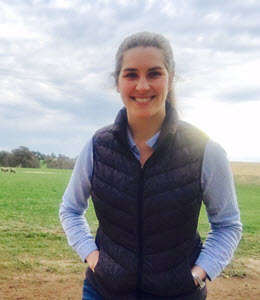Internship offers risk management for growing business

Georgia Reid is relishing the opportunity to develop skills and experience within a growing business.
“With the support of the MLA Future Livestock Consulting Internship (FLC) program, there is less pressure on me to be commercially viable while I upskill, and this gives more leeway for personal and professional development.”
Georgia hails from a mixed farm in south-west WA and has always been interested in a pathway in agriculture.
She completed her agricultural science degree at the University of Western Australia with an honours year investigating the impact of live export ban media coverage on WA livestock producers.
After a stint with the Royal Agricultural Society (RAS) working in the area of education and ‘agvocacy’, Georgia was keen for a more hands-on role working with producers.
“Following my studies I worked for the RAS where I hoped to help improve agriculture’s image, through public education,” Georgia explained.
“I now want to work from the inside out, helping promote sustainable and profitable productivity from within the industry, instead of pushing information at people who aren't that engaged,” Georgia said.
The timing of Georgia’s change of heart, the opportunity presented by the MLA intern program and the growing needs of an agricultural consulting firm based in Mt Barker aligned at the same time.
Risk management
Agricultural consultant Ed Riggall of AgPro Management has a growing business and was keen to invest in someone in the early stages of their career.
“The MLA FLC program enabled me to take a punt on someone I thought had potential, while easing the pressure on the business during that training and development phase,” Ed said.
The investment from MLA gives Ed the flexibility to encourage Georgia to attend a wide range of learning opportunities, both as part of the program and more informal opportunities such as field days and industry events.
“In a growing business the financial side matters to me, but I can quite happily send Georgia off to a field day thanks to the program – in the meantime she is spreading our brand and learning,” he said.
Multiple benefits
For Georgia the benefits of the program are many. Beyond day-to-day work with the company, she is also enjoying the knowledge and experiences offered through the UNE Graduate Certificate in Rural Consulting, which is a core part of the FLC program , and appreciates the opportunities to build her professional networks across Australia.
“As a young professional it is quite a unique position to be in,” Georgia acknowledged.
“I’m making connections across the country and everyone is so willing to support and help you learn.”
Georgia has also recently returned from a ‘meat technology’ tour in the eastern states as an elective component of the graduate certificate.
“The tour was incredible – we experienced the whole supply chain and had access to a broad range of organisations. It helped cement the important of on-farm and abattoir processes in determining meat quality and prices, which I can now better explain to the company’s clients.
Feedbase focus
Together with Ed, Georgia is busy working on a range of producer-driven feedbase projects investigating pasture manipulation (spraying timing), grazing cereal crops, and the role of chaff carts as a feed gap resource.
The team is also involved with a grower group looking at alternative legume pastures – such as biserrula, serradella, bladder clover and sub-clover varieties not currently used in WA.
They also will be interested in delivering the MLA Profitable Grazing Systems program in WA, after being involved in the pilot groups.
Georgia is keen to see efficiency across feedbase projects, and for new projects to build on what have been learnt before to avoid reinventing the wheel.
“New agricultural research needs to build on or include what we have learnt from previous projects, which may have been carried out elsewhere – there needs to be greater sharing and collaboration of the data. I believe this is both a local and nationwide issue,” Georgia said.
In the meantime Ed is thrilled with having Georgia on board, and while she is still
Learning, he is confident she is making a vital contribution to the business.
“Georgia is well on her way, and the more people and organisations she meets, the more she learns, and the more it builds the capacity of our business – it’s a win–win for everyone,” Ed said.
Contact:
Georgia Reid – AgPro Management (WA):
E: georgia@agpromanagement.com
T: 0447 523 110


